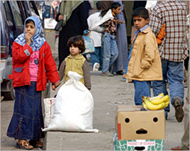Iraq FM slams Arab stand
Iraq’s foreign minister has harshly criticised Arab states for not taking a greater role in Iraq, saying they should forgive the country’s debts and open diplomatic missions and warning they are leaving a void for Iran to fill.

Hushyar Zibari made the comments on Saturday as Arab foreign ministers met in the Sudanese capital, Khartoum, to prepare for a summit of Arab leaders on Monday and Tuesday.
The summit aims to tackle a string of major issues facing the region – including violence in Iraq and the Palestinians’ formation of a new Hamas-led government.
Iraq’s Shia leaders have frequently expressed bitterness over Arab states’ slowness in showing support for the country’s new leadership, suggesting the Arab League – whose 22 members are majority Sunnis – is biased towards Iraq’s Sunni minority, which enjoyed power during the rule of ousted leader Saddam Hussein.
But the strong criticism was striking coming from Zibari, a Kurd who as foreign minister has played the role of point man with Arab nations.
He accused some Arab governments of seeing Iraq’s new leadership as illegitimate and hoping for attempts at democracy in the country to fail.
Iran’s influence
During Saturday’s meetings, some Arab officials expressed concerns over Iran’s influence in Iraq and complained about planned meetings between US and Iranian officials aimed at stabilising Iraq, Zibari said.
Arab governments have only themselves to blame, he said.
“If they [Arab governments] are not there, other states will not hesitate to fill the gap,” he told a Khartoum press conference.
 |
|
A summit of Arab leaders takes |
“There should be realistic and practical Arab initiatives towards Iraq,” he said.
“We in Iraq have complaints about the Arab role in Iraq. There is nothing tangible and there are no concrete measures to help the Iraqi people … The Arab role is absent in Iraq while there are regional and international initiatives.”
Zibari chided Arab states for not doing more to help strengthen the government.
“Why has the Paris Club cancelled or reduced [Iraq’s] debts, but the Arabs haven’t?” he said, referring to the grouping of Western lending nations, which in September 2004 agreed to reduce by 80% Iraq’s $38.9 billion in debt owed to its members.
He said the Iraqi government is ready to provide facilities and security for Arab embassies in Baghdad to open.
Embassies plea
“We demand that Arabs should do that [open embassies] immediately,” Zibari said.
Last year, Arab League members promised to begin sending ambassadors to their mission in Baghdad, which have been operating with lower-level staffing since the 2003 US-led invasion that toppled Saddam.
But the initiative ground to a halt after a top Egyptian diplomat and two Algerian diplomats were kidnapped and killed by anti-US fighters in July.
 |
|
Zibari questioned why Arabs |
Arab governments have said security reasons are holding them back from sending ambassadors.
But Zibari said that “should not be an excuse”.
“There are many other embassies that have been attacked but they stayed and beefed up their protection. This was a pretext to leave Iraq, to avoid any diplomatic or political relation with Iraq, because there are doubts [among Arab governments] about the legitimacy of the Iraqi government,” Zibari later told the Al-Arabiya TV news network.
He also said some Arab governments “fear the results of the Iraqi experiment’s success and its effects on their countries”.
Iraqi leaders have seen the failure to step up the diplomatic missions as a reluctance to support the new post-Saddam government.
Slow response
Many Arab governments have also been slow to strengthen ties because they do not want to appear to condone the US invasion.
The Arab League – a 22-member body that groups Arab nations, including Iraq – has promised to send a permanent representative to Iraq, an initiative likely to be discussed in Khartoum.
The league is also trying to put together a reconciliation conference between Iraq’s Shia, Sunni and Kurdish leaders in June, but there has been no confirmation it will take place.